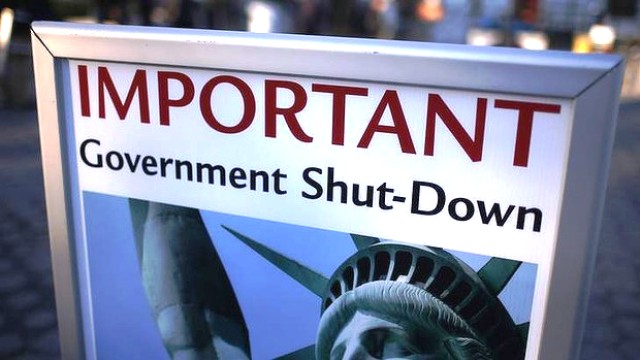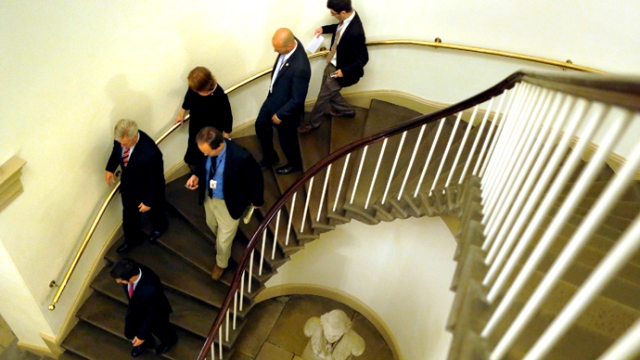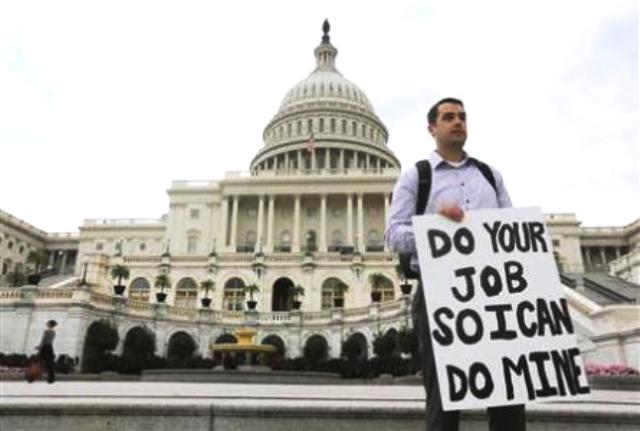
The superpower shuts down
800,000 federal government employees have been forced to go on unpaid leave. The economic world should be worried.
Congratulations to the United States Congress.
It has accomplished something that America’s enemies—including al Qaeda—have long wanted to achieve: Bring the government of the world’s sole superpower to a screeching halt.
We Washingtonians are used to talking about shutdowns. Several times in recent years, Congressional gridlock has threatened to bring the government to its knees. Yet last-nanosecond deals have always averted disaster.
Not this time.
The story is sadly simple. Congress can’t agree on how to fund the federal government beyond October 1, the start of the new US fiscal year. In recent days, the Republican Party (goaded by its ultra-conservative Tea Party wing) has passed several stopgap measures that fund the government for a few weeks. Democratic Party members have rejected each one, because the measures all seek to undermine President Obama’s new health care law—which dares (perish the thought) to expand health insurance coverage in America.
 Photo: AFP
Photo: AFPSo, as a result, 800,000 federal government employees around the country—significantly more people than the 632,000 living in Washington, DC—will be “furloughed,” a euphemism for being forced to go on unpaid leave.
 Photo: Reuters
Photo: ReutersFeds in America, unfortunately, are often subjected to nasty stereotypes. They are derided as lazy, entitled, and, according to a Republican strategist pontificating on a Fox TV broadcast just minutes before the shutdown began, “cry-babies”. Conservative Republicans are the chief—though certainly not the only—propagators of these narratives.
 Photo: AFP
Photo: AFPIn reality, US government employees are none of these things. What many of them are, however, is in big trouble. Just consider the low-wage federal workers—janitors, cafeteria workers—heavily dependent on every precious paycheck.
The shutdown’s ripple effects are troubling. Consider the low-income women and children who receive Department of Agriculture-funded nutrition assistance, which will be cut off. Or, tragically, the children unable to receive cancer treatment at the National Institutes of Health.
Ironically—and perhaps fittingly—members of Congress, with their 10 percent approval rating, will continue to get paid throughout the shutdown.
 Photo: Reuters
Photo: ReutersOn Tuesday, the day the shutdown began, I took a walk during my lunch hour. My office is located near the White House and other government facilities, and directly across from the imposing Environmental Protection Agency building—which, so far as I could see, was completely empty. Federal workers had been allowed to come to their offices for several hours in the morning to get their affairs in order, and they were now heading home. They glumly shuffled toward the Metro station, furlough letters in tow, about to embark on an indefinite period of forced unpaid leave. It was eerily quiet, save for the energetic banter of TV crews sizing up shots of the US Capitol building several blocks away.
 Photo: Reuters
Photo: ReutersAs I took this all in, an unsettling thought came to mind: How can we, American foreign affairs analysts, credibly do our jobs under these circumstances? We are paid to point out shortcomings in other countries—and yet our own nation can’t even keep its government running. Whenever we lift a finger, we’ll be guilty of hypocrisy.
Certainly, the shutdown and its troubling consequences pale in comparison to the far-more-serious crises that so many other countries face at any moment. And in a twisted way, the shutdown actually highlights America’s successes. As the Washington Post’s Max Fisher wrote the other day,
“America's little self-imposed crises are a luxury, a reminder not of any innate Libyan-style brokenness but of the spoiled sense of entitlement with which we abuse our own fabulous wealth.”
Perhaps this is why many Americans, far outside the Beltway, pay little mind to the happenings inside Washington and take very little interest in the shutdown (though keep in mind that federal employees are spread far across the country, and those in many states will suffer).
 Photo: Reuters
Photo: ReutersHowever, if the shutdown drags on for more than a few days—and water cooler whisperings and pundits alike are strongly suggesting it will—it becomes a matter of considerable national, and international, concern.
A shutdown is estimated to cost the Washington, DC region $200 million a day—significant losses, yet not figures that constitute a national crisis. However, a month-long shutdown could claim 1.4 percent of economic growth. And if the shutdown continues into mid-October, and Congress fails to resolve an even greater looming crisis—how to extend the nation’s debt limit, with a deadline of October 17—then economists warn of spending cuts that could “easily tip the economy into recession”.
So what does this all mean?
In essence, America today is a staggering, slouching superpower. Its people, and the world, have good reason to be worried.
 Photo: Reuters
Photo: ReutersAs for me, I have good reason to hesitate before saying or writing anything about Pakistan’s problems.
It just doesn’t seem to be the right time, given the travesties taking place in my own backyard.




COMMENTS (6)
Comments are moderated and generally will be posted if they are on-topic and not abusive.
For more information, please see our Comments FAQ